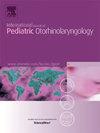推动拉丁美洲新生儿听力筛查:儿科耳鼻喉科医生的见解。
IF 1.2
4区 医学
Q3 OTORHINOLARYNGOLOGY
International journal of pediatric otorhinolaryngology
Pub Date : 2024-10-05
DOI:10.1016/j.ijporl.2024.112122
引用次数: 0
摘要
目的:评估拉丁美洲新生儿听力测试立法措施和法规的实际应用情况:评估拉丁美洲新生儿听力检测立法措施和法规的实际应用情况:向美洲小儿耳鼻喉科协会(IAPO)网络发送了一份在线调查,调查新生儿听力筛查的实践情况。调查共提出了 12 个问题,涉及新生儿听力筛查的立法、实施和障碍:共有 89 名儿科耳鼻喉科医生参与了此次调查,他们分别来自 20 个拉丁美洲国家。大多数受访者(64%)表示各自国家有新生儿听力法律,并正确说出了具体的法律名称。但值得注意的是,超过半数(58%)的儿科耳鼻喉科专家表示,这些法律并没有在他们的日常临床工作中得到贯彻执行。来自五个国家的受访者透露,新生儿听力筛查没有在婴儿出生后的第一个月内进行:结论:虽然大多数拉美国家都制定了有关新生儿听力筛查的法律,但由于经济障碍,这些法律在临床实践中并没有得到应用。拉丁美洲各国在新生儿听力筛查方面仍存在明显差距。我们的研究为解决这些问题提供了重要的见解和建议,包括需要加强立法执行力度、增加资金投入、改善基础设施、开展有针对性的专业培训和扩大公众教育,以加强拉丁美洲医疗保健的这一重要方面。本文章由计算机程序翻译,如有差异,请以英文原文为准。
Advancing neonatal hearing screening in Latin America: Insights from pediatric otolaryngologists
Objective
To assess the real-world application of legislative measures and regulations governing newborn hearing testing in Latin America.
Methods
An online survey was sent to the Interamerican Association of Pediatric Otorhinolaryngology (IAPO) network to investigate neonatal hearing screening practices. Twelve questions were asked about legislation, implementation, and barriers to neonatal hearing screening.
Results
A total of 89 pediatric otolaryngologists representing 20 Latin American nations participated in this survey. The majority of respondents (64 %) indicated the existence of neonatal hearing laws within their respective countries and correctly named the specific legislation. However, it is noteworthy that over half (58 %) of pediatric ear, nose, and throat specialists reported that these laws are not consistently put into practice in their daily clinical routines. Respondents from five countries disclosed that neonatal hearing screening is not conducted within the first month of an infant’s life.
Conclusions
While the majority of Latin American nations have established legislation concerning neonatal hearing screening, its application in clinical practice is lacking due to economic obstacles. Marked disparities across Latin America persist for neonatal hearing screening. Our study provides key insights and recommendations aimed at addressing these issues, including the need for stronger legislative enforcement, increased funding, improved infrastructure, targeted professional training, and expanded public education to strengthen this vital aspect of healthcare in Latin America.
求助全文
通过发布文献求助,成功后即可免费获取论文全文。
去求助
来源期刊
CiteScore
3.20
自引率
6.70%
发文量
276
审稿时长
62 days
期刊介绍:
The purpose of the International Journal of Pediatric Otorhinolaryngology is to concentrate and disseminate information concerning prevention, cure and care of otorhinolaryngological disorders in infants and children due to developmental, degenerative, infectious, neoplastic, traumatic, social, psychiatric and economic causes. The Journal provides a medium for clinical and basic contributions in all of the areas of pediatric otorhinolaryngology. This includes medical and surgical otology, bronchoesophagology, laryngology, rhinology, diseases of the head and neck, and disorders of communication, including voice, speech and language disorders.

 求助内容:
求助内容: 应助结果提醒方式:
应助结果提醒方式:


